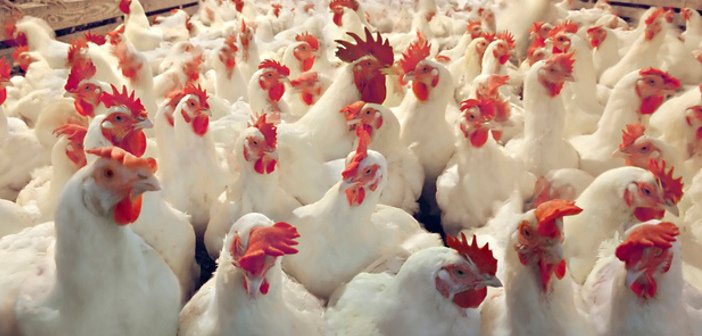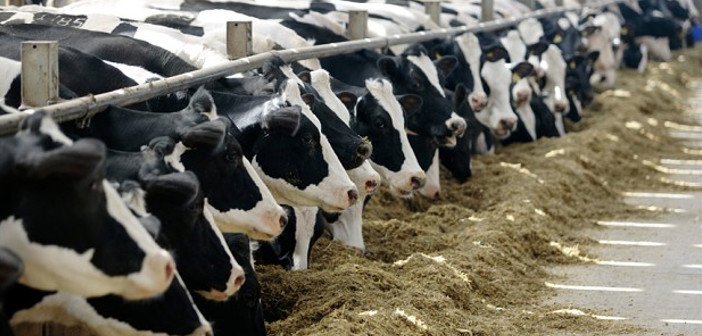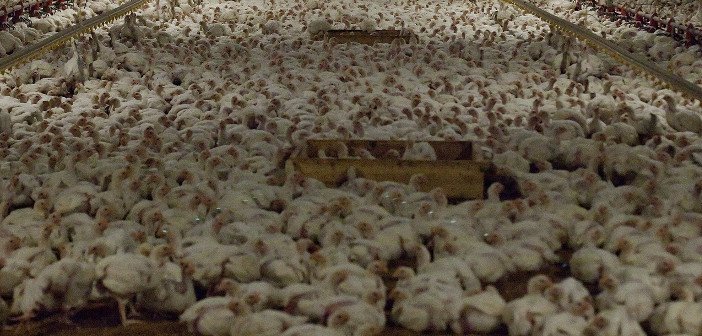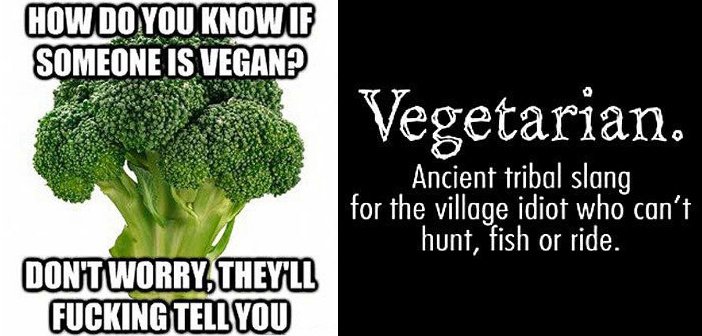Your Flesh Is So Nice
Last year I spent a day filming a conference for people who work with assistance dogs. The event featured a number of speakers who trained these animals to work with the physically disabled, people with autism, the blind and deaf. Many of the trainers brought their dogs onstage. The crowd adored them and they were, of course, the real stars of the show.
Unsurprisingly, the common refrains from the speakers were ‘I love animals’, ‘Animals are my life’ and words to that effect. It was quite inspirational.
Lunchtime rolled around and the hundred-strong crowd filed into the dining area. There were no vegetarian options. This in itself didn’t strike me as unusual. But what was amazing was that everyone, speakers included, were invariably tucking into large helpings of beef, pork, chicken and lamb. It seemed that the outpouring of love for animals was in reality, reserved only for some animals.

I couldn’t get over the scale of the cognitive dissonance: It’s perfectly ok to say ‘I love animals’ with a tear in your eye, then sit down at a table and tear an animal apart.
But that’s what we do. And until recently, I never saw a problem with it.[pullquote]But what was amazing was that everyone, speakers included, were invariably tucking into large helpings of beef, pork, chicken and lamb. It seemed that the outpouring of love for animals was in reality, reserved only for some animals.[/pullquote]
I ate meat for 30 years, and I really, really enjoyed it. I loved the taste and the smell. Not having an animal on my plate was a rare event. What happened to the animals to get them to my plate didn’t concern me. I had a vague awareness, as most meateaters do, that the animals probably hadn’t had wonderful lives. But this was stifled by a dim, non-deliberated idea that whatever was happening to them was ok because well, humans are at the top of the food chain.
My younger sister had been a veggie for most of her life but aside from some verbal sparring at the dinner table, I never thought it worth discussing. To my mind it held roughly the same ethical value as preferring dance music to jazz. One day, in the midst of an unusually sincere conversation I asked her why she had adopted the vegetarian lifestyle. I was taken aback by her response:
“I think that eating animals is insane.”[pullquote] I did what most carnivores do when faced with the darkest implications of their actions: I stopped thinking about it and kept eating meat.[/pullquote]
That stuck in my mind. For an intelligent, compassionate person to think that the actions of another (my actions), however socially acceptable, are “insane”… There had to be something wrong. And yet, I did what most carnivores do when faced with the darkest implications of their actions: I stopped thinking about it and kept eating meat.
I later ended up living with a good friend who had recently turned vegetarian. Through a process of intellectual osmosis, and seeing him cook amazing meals, I found myself purchasing less and less meat when shopping.
And one day I came across vegan activist Gary Yourofsky’s famous talk in which he calmly and comprehensively lays out the true cost of a meat-based diet.
The argument was airtight, and so I stopped eating meat.

I only refer to my own story as an illustration that I used to be a devout, every-meal meateater. And I stopped, and it was very, very easy to do.
Not only was it easy, but it felt great. Physically, you are immediately lighter on your feet and more energized due to there being less pressure on your digestive system. A veggie diet means lower cholesterol, less risk of heart disease, lower blood pressure and cancer rates - not to mention that it’s tough to be overweight as a veggie and pretty much impossible as a vegan.[pullquote]A veggie diet means lower cholesterol, less risk of heart disease, lower blood pressure and cancer rates - not to mention that it’s tough to be overweight as a veggie and pretty much impossible as a vegan.[/pullquote]
I also developed a new sense of mental and spiritual well-being. On some latent level I felt like I was now a co-habitant of the planet rather than a consumer of it. Ethically, the dim awareness turned into bright light: when I stopped my passive participation in the meat industry, I didn’t have to suffocate my own (innate and reasonable) ethical outrage with flimsy, dismissive arguments.
I won’t go into it in detail because all of the information is already out there and easily accessible; but the horrors that are inflicted upon animals in factory farms are so anathema to everything compassionate in the human spirit that just to read about them is disturbing. The absolute worst things that you can imagine happening to an innocent, conscious, frightened being are happening on an industrial scale so they can be plated and served. It’s natural and right to be profoundly horrified and upset to your core about any sentient being enduring that kind of brutality.

These conditions, as you might imagine, have serious knock-on effects for the consumer. For example, the animals are so sickly that they must be preemptively pumped full of antibiotics just to keep them alive. This, as you might imagine, is very bad for the person who eats the animal. In fact, eating processed meats is so bad for you that the World Health Organization have said outright that they are a carcinogen; that is to say, something that causes cancer.[pullquote]The absolute worst things that you can imagine happening to an innocent, conscious, frightened being are happening on an industrial scale so they can be plated and served.[/pullquote]
And that’s not to even mention the environmental cost. The meat and dairy industries are catastrophically damaging to the planet, requiring 160 times more land and producing 11 times more greenhouse gases than potatoes, wheat or rice. The combined climate change emissions of animals bred for their meat are over 18% of the global total – more than cars, planes and all other forms of transport put together.
And as the planet slides towards global water shortages, forget about conservation if you’re a meateater. Every burger requires 2500 litres of water to produce. That’s the equivalent of two months’ worth of showering. Per burger.
You simply cannot claim to care about the environment while eating a meatbased diet.

Ethically, environmentally, for your own health - avoiding meat and animal products is a no-brainer. And yet, the decision to not eat meat is still in a weird cultural limbo of quasi-acceptance: The running gags about vegans being intellectually pushy but physically weak, the accusations of a bleeding-heart liberal agenda, the staggeringly ill-informed puff pieces from carnivorous journalists who can even go so far as to compare the conscious and careful choices of veganism to a “jihad”.
If your dietary choices are based on religious beliefs from ancient texts (i.e., Kosher, Halal) it’s perceived as a hallowed choice that must be respected. If you decide to do it because of compassion, health and the environmental destruction that’s happening in the world right now - your decision can be wide open for interrogation.
How is it possible that not wanting to partake in the meat industry is still culturally atypical?
Because we are surrounded by well-funded messages that tell us that it’s just fine. Adverts for McDonalds that tell us with bright pastel colours that “taste is an important thing”.
We see ads for KFC where children who support opposing football teams are somehow brought together by the magic of a bucket of chicken.
[iframe id=”https://www.youtube.com/embed/GZnS4i7KlnU” align=”center” mode=”normal” autoplay=”no” maxwidth=”750″]
(KFC, by the way, are notorious for their abhorrent track record in animal welfare. They purchase upwards of a billion chickens per year, and in an industry in which atrocity is routine, KFC outdo all the rest, endorsing the most blood-curdling practices in their ‘production facilities’. They are, according to author Jonathan Safran Foer, ‘arguably the company that has increased the sum total of suffering in the world more than any other in history’.)
The bright colours, the off-theme advertising - It’s a facade to convince you that you don’t need to think about the wholesale suffering that has brought you that plate of food. Meat production companies know this and that’s why it’s nigh on impossible to gain access to factory farms unless you work there. If people knew what happens behind those walls, the industry would collapse.[pullquote]The combined climate change emissions of animals bred for their meat are over 18% of the global total – more than cars, planes and all other forms of transport put together.[/pullquote]
And yet, this obfuscation works.
When you’re surrounded by media and eateries that promote “togetherness”, it’s almost impossible to imagine that they could be built on industrialized brutality. And it’s so much easier to dismiss animal welfare when the biggest food companies in the world are telling you that “it’s fine!” It’s such a convincing song and dance that, without research, it’s almost a non-question. Socially, if you make the decision to not participate in the meat industry, you’re usually the odd one out.
This artifice is bought into so completely that it convinces people to actively voice their right to eat processed animals. I’ve seen all of these classics on social media:

Culturally, these attitudes are commonplace. Kindness and empathy be damned; You’re a Grade-A moron for ever questioning eating meat.
What irks me most is the idea that there is something masculine about a meat-based diet. Something manly. That somehow eating processed meat harks back to one’s cave-dwelling ancestors who had to hunt and kill their food; that it’s “real” food or “man” food.[pullquote]In fact, if we can define adult masculinity as having personal responsibility and compassion, you’ll find that eating processed meat is as far from those ideals as your ancestors are from you.[/pullquote]
It isn’t. In fact, if we can define adult masculinity as having personal responsibility and compassion, you’ll find that eating processed meat is as far from those ideals as your ancestors are from you.
There is a terrible, vacuous logic behind these attitudes. I was guilty of it for years - and if you wish to subscribe to it, McDonalds’ advertising budget will always be there to back you up.
Instead of thinking about your dietary decisions, you can always fall back on weak jokes, flashy ads and carcinogenic food. Nobody will ever stop you.

It’s a logic that also quietly incites the cruelest streak in human nature, the implication that we’re at the top of the food chain and that the animals deserve to die.
“Nature is cruel. We eat animals, we’ve just gotten really good at it.”
Wrong. Being cruel requires having an awareness of what cruelty is. I know that if I order a chicken burger, the animal that I’m eating lived a life of torment that I can’t even imagine. And I can choose not to engage in that. When we engage anyway, we put up an invisible wall between ourselves and the animals, one that separates our experience from theirs. We don’t really think that they suffer.[pullquote]Instead of thinking about your dietary decisions, you can always fall back on weak jokes, flashy ads and carcinogenic food. Nobody will ever stop you.[/pullquote]
They’re animals, they’re dumb, they’re food, they’re nothing. We have to believe that.
We have to believe it because the other option is so mind-breakingly awful that it cannot be entertained. What if these billions of beings who are slaughtered, who live lives of abject misery, whose genetically-modified bodies are vessels of pain from birth to death… What if they have just as much right to life as you or I?
That can’t be right.
But… What if it is? What if the natural compassion so suffocated by a meat-eating culture is allowed to breathe? What if, as humans, our natural resting state is compassion, of not allowing passive brutality?
In his book ‘Eating Animals’, Jonathan Safran Foer speaks to many advocates of animal welfare. And yet, the most telling interview is with an old-school poultry farmer who is horrified by the modern meat industry:
People care about animals. I believe that. They just don’t want to know or to pay. A fourth of all (battery) chickens have (broken bones). It’s wrong. They’re packed body to body, and can’t escape their waste, and never see the sun. Their nails grow around the bars of their cages. It’s wrong. They feel their slaughters.
It’s wrong, and people know it’s wrong. They don’t have to be convinced. They just have to act differently. I’m not better than anyone, and I’m not trying to convince people to live by my standards of what’s right. I’m trying to convince them to live by their own.
The thing is, if you want to keep eating meat, nobody can stop you. You’ll have the total support of an industry which ultimately cares nothing for the animals, for the environment, for your health. And that’s your choice. But what you can’t do is sit on the fence about it.
In a first world country, with the information readily available, you have to make an informed decision. If you’re going to eat meat, you have to own that choice. You must know the industry that brings it to you: The sanctioned cruelty, the environmental destruction, the health risks. Don’t defer to tradition or half-baked ideas of human superiority.
Just take a look, and decide for yourself.
Further Watching:
Gary Yourofsky: The Best Speech You Will Ever Hear
Erin Janus: Dairy is f**king scary: The industry explained in 5 minutes
Erin Janus: Food for thought: Chicken
Cowspiracy (produced by Leonardo DiCaprio). Available on Netflix
Thanks to Morna and Ciara O’ Connor for editorial goodness.
